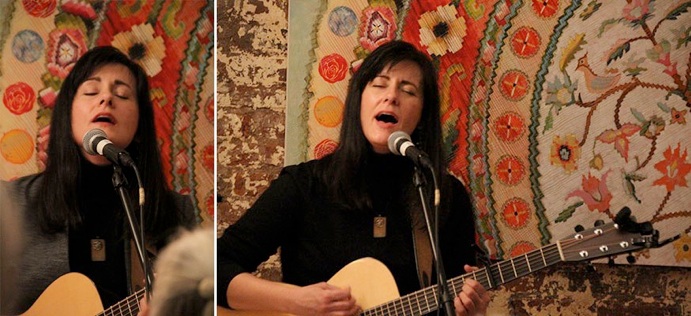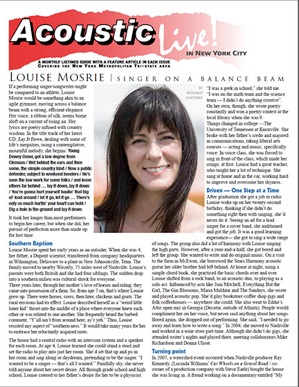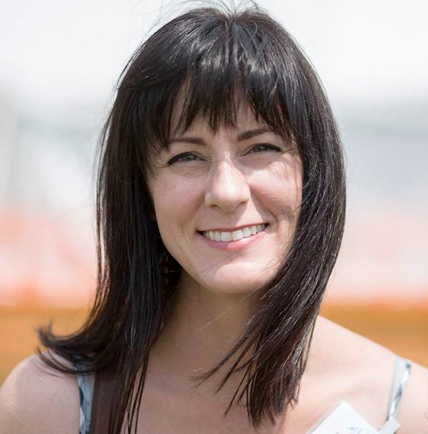If a performing singer/songwriter could be compared to an athlete, Louise Mosrie would be something akin to an agile gymnast, moving across a balance beam with a strong, efficient elegance. Her voice, a ribbon of silk, seems borne aloft on a current of rising air. Her lyrics are poetry infused with country wisdom. In the title track of her latest CD, Lay It Down, dealing with some of life’s inequities, using a contemplative, mournful melody, she begins: Young Dewey Oxner, got a law degree from Clemson / Wet behind the ears and then some, the simple country kind / Now a public defender, subject to weekend benders / He’s seen the law work for some folks / and leave others far behind … lay it down, lay it down / You’re gonna hurt yourself haulin’ that big ol’ load around / let it go, let it go … There’s only so much hurtin’ your heart can hold / Dig a hole in the ground and lay it down.
It took her longer than most performers to begin her career, but when she did, her pursuit of perfection more than made up for lost time.
Southern Baptism
Louise Mosrie spent her early years as an outsider. When she was 4, her father, a DuPont scientist, transferred from company headquarters in Wilmington, Del. to a plant in New Johnsonville, Tenn. The family moved to nearby Waverly, 75 miles west of Nashville. Louise’s parents were both British and she had four siblings. The sudden drop into a Southern milieu was culture shock for everyone.
Three years later, through her mother’s love of horses and riding, they came into possession of a farm in neighboring McEwen. So, from age 7 on, that’s where Louise grew up. There were horses and cows, and then later, chickens and goats. The rural environs had its effect. Louise described herself as a “weird little loner kid” thrust into the middle of a place where everyone knew each other or was related to one another. She frequently heard the barbed comment, “Y’all ain’t from around here, ay’r yeh.” Thus, Louise resisted any aspect of “Southern-ness.” It would take many years for her to embrace her reluctantly acquired roots.
The house in Waverly had a central radio with an intercom system and a speaker for each room. At age 4, Louise learned she could stand on a stool and set the radio to play into just her room. She’d set that up and go in her room and sing along or daydream, pretending to be the singer. “I wanted to be a singer — that’s all I wanted.” Painfully shy, she never told anyone about her secret desire. All through grade school and high school, Louise catered to her father’s desire for her to be a physicist. “I was a geek in school,” she told me. “I was on the math team and the science team — I didn’t do anything creative.” On her own, though, she wrote poetry constantly and won a poetry contest at the local library when she was 9.
Things changed in college at the University of Tennessee at Knoxville. She broke with her father’s credo and majored in communications, taking liberal arts courses — acting and music, specifically voice. In voice class she was forced to sing in front of the class, which made her cringe at first. Louise had a great teacher who taught her a lot of technique. She sang at home and in the car, working hard to improve and overcome her shyness.
Driven — One Step at a Time
After graduation she got a job in radio. Louise woke up on her 22nd birthday, thinking if she didn’t do something right then with singing, she’d never do it. Seeing an ad for a lead singer for a cover band, she auditioned and was hired. It was a good learning experience — she sang a wide range of songs. The group also did a lot of harmony with Louise singing the high parts. However, after a year and a half she became bored and left the group. She wanted to write and do original music. On a visit to the family farm, she borrowed the Sears Harmony acoustic guitar her older brother had left behind. At home at night, using a simple chord book, she practiced the basic chords over and over. Louise shifted from a rock band, to an acoustic duo, to playing as a solo act. Influenced by acts like Joni Mitchell, Everything But the Girl, The Gin Blossoms, Maria Muldaur and The Sundays, she wrote and played acoustic pop. She’d play bookstore coffee shop gigs and folk coffeehouses — anywhere she could. She also went to Eddie’s Attic mics in Decatur, Ga., outside of Atlanta. People would compliment her on her voice, but never said anything about her songs. Bored again, she dropped out of performing. “I needed to go away and learn how to write a song,” she said. In 2004, she moved to Nashville and worked in a wine store part time. Although she didn’t do gigs, she attended writer’s nights and played there, meeting collaborators Mike Richardson and Donna Ulisse.
Turning Point
In 2007, a watershed event occurred when Nashville producer Ray Kennedy (Lucinda Williams’ Car Wheels on a Gravel Road and co-owner of a production company with Steve Earle) bought the house where she was living. A friend working on a documentary titled “My Vietnam Your Iraq” asked her to write a song for the film. Sensing she could benefit from an experienced hand, she called Ray to help with the song. They spent six exhausting hours writing it, during which he taught her about songwriting. Adding almost nothing of his own, he pushed her to write, saying, “you can do better — dig! It’s all about imagery and impact. If a line doesn’t have a great image or emotional impact, you need to change that line.” She realized that to write using imagery, she’d need to write about what she knew … the South. In that manner, she finally “came home.”
Applying what she learned from Ray and working with Mike and Donna, Louise wrote the songs that wound up on her first album, Home. In 2009, she was in the middle of working on Home and sent in two unmixed demos to Kerrville Folk Festival — “Home” and “God Lives in Arkansas.” After entering for 10 years straight without getting in, she was accepted and was one of the six annual winners. She knew she was onto something. Other subsequent honors came from Telluride, Wildflower and Falcon Ridge Folk festivals.
Louise restarted her performing career by playing songs from Home at a (sadly now-defunct) “little dive” outside Nashville called Norm’s River Road House. It was the hangout for most all Americana artists at one time. She also frequented one or two other open mic type writer-in-the-round places in Nashville. Her songs generated increasing enthusiasm and she was on her way.
Home is a marvelous collection of songs with, for this listener, some particular standouts. “Maybe I’m Your Angel” is one of those. Describing human frailty, it is heart-wrenching in its plain-spoken plea for an affirmation of love from a non-committal companion. You make it hard to love you / when I want so much to love you / you hold me close like money in your hand / but when tomorrow comes / you’ve spent me back again …
Home was made with a full studio production: pedal steel guitar and the works. Lay It Down, brilliantly produced by Cliff Eberhardt, is more stripped down and spare — the songs starkly beautiful. Cliff does all the backup instrumentals; his Dobro work is sublime. There isn’t a clunker on either Home or Lay it Down. It’s just one jewel after another.
See Louise whenever she visits our area. She’ll charm you with her wry sense of humor and thrill you with an acrobatic display of music and poetry … and she’ll definitely nail the landing.
Louise Mosrie is seen here mesmerizing the audience during her recent performance
at Kathryn’s Space House Concerts in Manhattan’s East Village.

Website: www.louisemosrie.com
.


